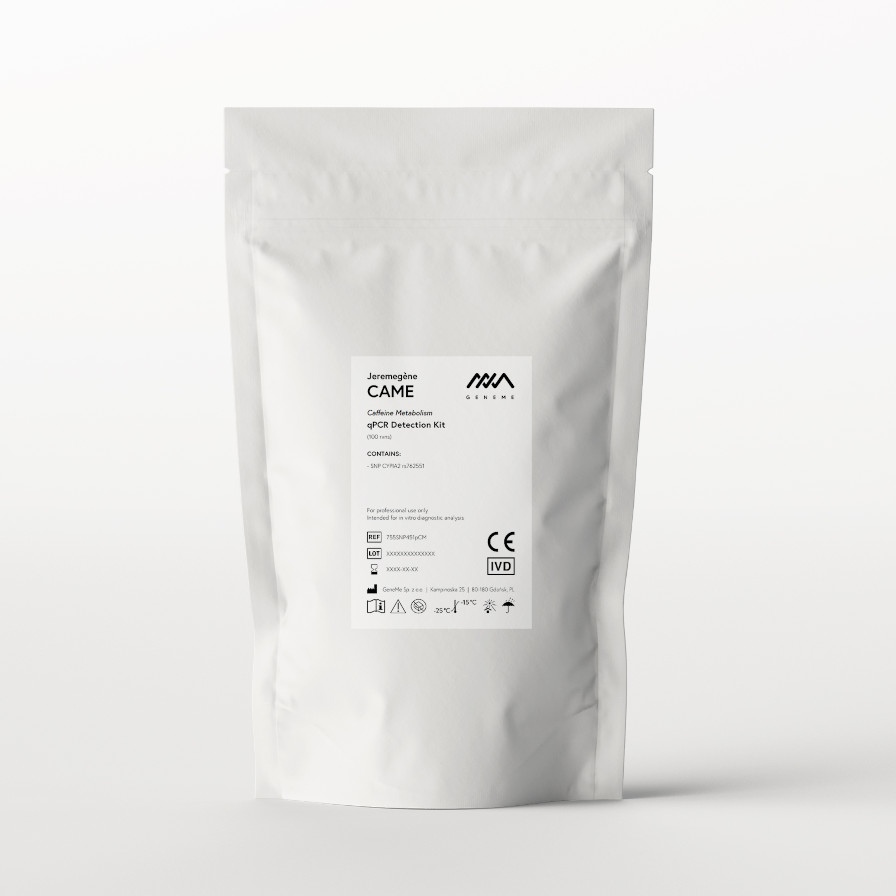CAME
(Caffeine Metabolism)
qPCR SNP Detection Kit

Description
Analysed gene is responsible for, among others, the caffeine metabolism rate. The process of removing caffeine from the organism may take place at different rates, largely depending on the variant of the CYP1A2 gene a person has.
REF. NUMBER
755SNP451pCM
PREDISPOSITION
Caffeine Metabolism
ANALYSED GENE
CYPIA2
IDENTIFIED POLYMORPHISM
rs762551
KIT CONTENTS
1 × Nuclease-Free Water
1 × 2xSNP MasterMix
1 × Oligos Set
1 × Positive Control Set
QUANTITY
100 rxns
STORAGE CONDITIONS
-25°C to -15°C
CERTIFICATES
More Information
Did you know...?
Caffeine is the most commonly used psychoactive substance in the world. The most common sources of caffeine are coffee, tea and, to a lesser extent, cocoa. Caffeine is also a common ingredient in energy drinks, cola drinks, as well as chocolate and certain medications. The health effects of caffeine depend largely on how quickly it is metabolized by the body. Caffeine metabolism is genetically determined.
Why knowledge about caffeine metabolism is important?
Excessive caffeine consumption is a known risk factor for cardiovascular disease and even heart attack. However, this applies primarily to people who metabolise caffeine slowly. In addition, these people eliminate toxic and carcinogenic compounds from the body more slowly. Symptoms of slow caffeine metabolism: headache, restlessness, drowsiness, irritability, trembling hands, insomnia. People with slow caffeine metabolism are characterized by a prolongation of this process and a stronger effect of caffeine on the body. This means that for them, caffeine has stronger stimulating properties, and the effects of its consumption last longer. In people with this gene variant, caffeine consumption should be kept to a level of 200 mg per day.
How the test is performed?
The CYP1A2 gene is a DNA fragment that contains instructions for building proteins that are involved in the metabolism of caffeine. SNP analysis using our reagents is fast and accurate. Thanks to the IFU instructions included in the kit, the lab technician can easily interpret the results. The reaction lasts about 2 hours, and the temperature-time profile is selected so that the laboratory can analyze several genes simultaneously using one device. Ready-to-use reagents are included in the kit. It is enough for the lab technician to add each of them in the right proportion and the reaction is ready. Quickly, easily and professionally.
How will the client benefit?
Interpretation of the obtained results, based on the IFU of the product included in the kit, allows for the preparation of a detailed report containing both the genotype description and recommendations indicating a further potential diagnostic path. The test we offer is relatively quick, uncomplicated and does not require a lot of lab work.
Why is it worth doing a genetic test?
Many people do not know about the metabolism of caffeine. They are looking for the cause of their problems. A genetic test will enable them to obtain this information as it pertains to caffeine consumption. The study of caffeine metabolism will give them information on how to optimize their caffeine intake.
What can be done after the test result?
A professional approach to the client will inspire his trust and ignite the desire to learn about other genes. A patient who has a genetic predisposition to slow caffeine metabolism potentially has other genetic mutations that indicate an increased risk of other diseases. Without the need for sequencing, clients can access information about many DNA fragments that affect key parameters of their lives.